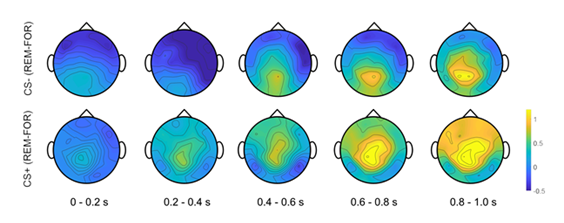Cognitive biases in associative hazard and safety learning: neurophysiological markers and possible interventions.

Contact Person:
Description:
Current research suggests that patients with anxiety disorders have difficulties in safety learning, i.e., danger is overestimated and fear responses to stimuli that do not pose a danger are increased. Physiological measures such as electroencephalography (EEG), functional magnetic resonance imaging, as well as eye tracking are used to investigate cognitive processes underlying safety learning in both healthy individuals and individuals with anxiety disorders. Thus, neurophysiological correlates of remembered and forgotten stimuli will be registered and the influences of instruction and attentional orienting will be investigated. The resulting findings will be used to develop simple cognitive strategies to improve safety learning.
Related Third-Party Funding:
Deutsche Forschungsgemeinschaft (DFG) - Projektnummer 378414384






